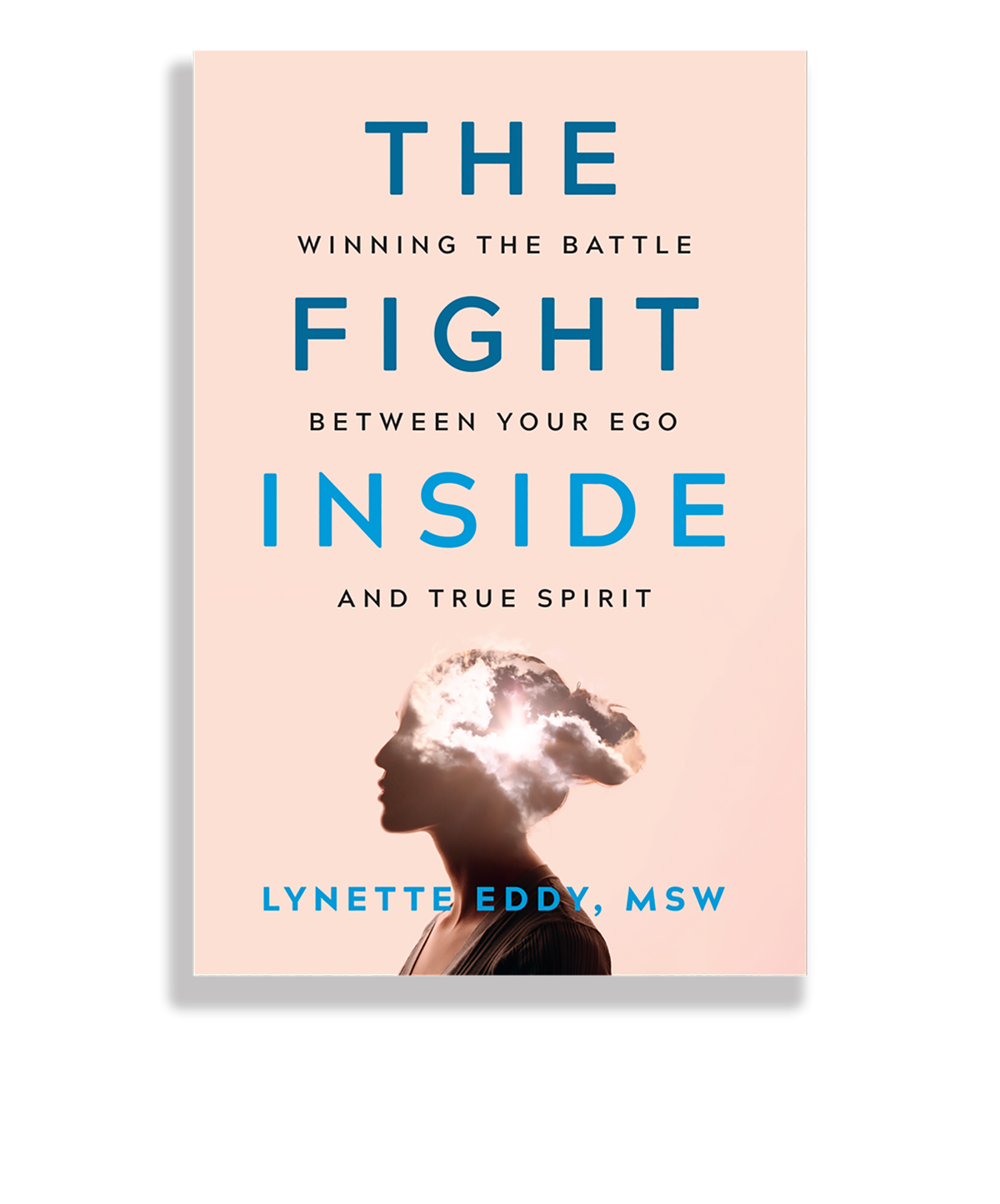A grandmother is teaching her granddaughter about life. “A fight is going on
inside us,” she said to the girl. “It is a terrible fight,and it is between two wolves.
One is evil-he is filled with anger, envy, sorrow, regret, greed, arrogance, lies and
superiority.” She continued, “The other is good-he is filled with joy, peace, love,
hope, kindness, truth, and compassion. The same fight is going on in all of us.”
The granddaughter thought for a moment and asked, “Which one will win? “The
grandmother simply replied, “The one you feed.”
Below are are some sample segments from “The Fight Inside”
-
Everyone, including myself, assumed Bob must have been clinically depressed. After spending some time studying the DSM, psychiatry’s bible used to diagnose patients with mental illness and personality disorders, I wasn’t so sure. Bob didn’t fit the basic criteria for a depressive disorder. While he did show signs of increased anxiety and detachment, he didn’t have a loss of appetite, sleep disturbances, lethargy, or diminished cognitive ability. I thought about asking his therapist to help me figure out what had been going on, but knew it was against the same code of ethics that I, as a new social worker, would be bound to uphold.
After trying to diagnose, label and classify the mental factors that caused Bob to take his life, I knew in my gut it simply was a matter of him giving up his spirit. He stopped listening to his inner voice.
I first recognized this during the last few years of his life. I could see that he was becoming someone who at times I didn’t recognize. Bob became more consumed with his business and seemed to always be searching for distractions and ways to avoid being still. He became restless, anxious, and constantly looked for new things to buy or ways to expand his business. He was obsessed with gaining status and recognition, believing that is what it’s all about. He never seemed to have or do enough, which was not the Bob I once knew. The Bob I knew was compassionate, thoughtful, and someone who appreciated nature and the small pleasures in life.
We used to hike and take time to sit in the forest and meditate together. I remember the last time we did this. He couldn’t sit still for more than a couple minutes before he was ready to head back. Eckhart Tolle writes, “When you lose touch with your inner stillness you lose touch with yourself. When you lose touch with yourself, you lose touch with the world.” I remember asking Bob at one point, “Do you own the mask or does the mask own you?” He looked at me without answering, then walked away. I could tell by the stunned look on his face and his inability to answer this question, that the mask had won.
A year before he took his life, I gave Bob a copy of “Live Simple and Easy” which I had read years ago written by the ancient Chinese Philosopher, Chuang Tzu. I told him I was worried that he was moving away from his true values. He knew what I meant but ignored what I was trying to tell him. I understood that the girlfriend, secrets, and lies were an attempt to fill the empty inner void he felt with temporary pleasures as his spirit weakened. The same copy of “Live Simple and Easy” that I had given him a year earlier was one of two things left in his briefcase on the day of his death. It read:
“What is meant by a “true man?” The true men of old were not afraid when they stood alone in their views. No great exploits. If we can free ourselves of the striving to be someone special, to be a certain way, or to have certain things-----free of that desire to be or to do or to have anything at all -----we can relax into the natural unfolding of the Dharma.’
The other thing left in his briefcase was an envelope addressed to me. It included a letter that said he made the choice to end his life and wished that I would respect that decision and he loved me. I struggled with his request to “respect his decision” as I could see and feel the devastation that his choice left me and the rest of our family. The last sentence that Bob wrote in his good-bye letter said, “I can’t live with myself any longer. I have chosen the Existential approach. It is my life and I have chosen to end it.” I am forever finding it hard to accept that ultimately it was his journey and that his choice to end it should be treated with acceptance and respect. I’m not sure I’ll ever get there.
-
As the days passed, I tried to imagine what could have been going on in Bob’s mind before he took his life. This question kept nagging at me until one day when I happened to be reading The Power of Now by Eckhart Tolle. He told how he experienced many years of depression and was on the brink of suicide. He said to himself, “I can no longer live with myself.” He described how he examined this thought and asked the question, “Am I one or two?” If I cannot live with myself, there must be two of me; the “I” and the “myself” that I cannot live with. He thought, “Maybe only one of them is real.” He found peace with the realization that the “I” was his true self witnessing the unhappy and deeply fearful false self that was at the root of his negative thoughts. He began to only listen to the voice of his true self and eventually the voice of his false self became silent. He described this false self as his ego. I cannot live with myself any longer. Wait, what? These were the exact words Bob wrote in his suicide letter. I put down the book and wondered, “Is this what happened to Bob?”
Looking back, it was clear that Bob’s spirit (the I that Eckhart spoke of) shrank as his ego (the self that Eckhart referenced) grew. When we first met, Bob listened to the voice coming from his spirit that reflected a sense of contentment and peace. He enjoyed the simple things in life and took time to “smell the roses.” The voice was calm and loving. This changed when he began to ignore this voice and listened to the voice coming from his ego. The voice from the ego told him he would find happiness with more money, possessions, and status. While he was still feeling unsatisfied, the voice told him temporary pleasures of girlfriends and gambling would fill this void. Of course, that didn’t happen. As time went on, the voice became louder and more negative until it became unbearable. He couldn’t live with it any longer.
-
In the months following Bob’s death, I kept thinking about this concept of the ego or the “false self.” What is it? Where did it come from? How could it be so destructive? I started reading everything I could find on the ego, and I became convinced that learning to manage this “false self” may be a way to prevent psychological suffering and discover true peace and happiness. Could it be that simple? I set out on a quest to learn everything I could about the ego and how it operates.
Ego isn’t just the definition of someone who is full of themself but possesses a more complicated and sinister meaning. It has been described for centuries by philosophers, psychologists as well as religious and spiritual leaders in different ways. Freud’s interpretation included Mommy issues and sexual repression which many feel is outdated and irrelevant. Carl Jung wrote, “The ego wants explanation always in order to assert its existence. Try to live without the ego. Don’t allow yourself to be led astray by the ravings of the animus. He will try every stunt to get you out of the realization of the stillness which is truly the self.” Ryan Holiday, author of Ego is the Enemy, wrote “Ego leads to envy, and it rots the bones of people big and small.”7 Wayne Dyer said, “The ego is only an illusion, but a very influential one. Letting the ego illusion become your identity can prevent you from knowing your true self.”
The thoughts of a young child are openhearted and filled with curiosity, wonder and love. Our caregivers reward and punish our behavior to teach us to conform with the norms of society. As children we learn to seek their approval and adapt to what is expected of us. Through our thoughts we begin to fear others and question our abilities. We eventually exchange who we truly are for who we think we should be.
Although the ego does what it can to suppress our true self, it isn’t all bad. It can serve as a useful tool to help us interact with the world through our conditioned self or personality. It helps with tasks, planning, job performance, and daily activities. Because the ego knows it’s an illusion, it competes with the true self to ensure its existence. This power struggle is where we often mess up. If we let our guard down and turn our authentic power over to the ego, we suffer. This psychological suffering can show up as a sense of isolation, greed, depression, insecurity, shame, guilt, anxiety, resentment, self-doubt and more. We ultimately live a life that’s false and set spirit denying limits on ourselves. We learn from the ego that if we stay in our comfort zone, we will not be vulnerable to judgement and failure. We usually choose the safe path which can be settling for a mediocre life that doesn’t allow us to fully experience joy, freedom, and authenticity.
The more I learned, the more I became motivated to understand how the ego operates in my own mind. If I understood how to manage my ego, would it be possible to rid myself of negative and self-defeating thoughts? Accomplishing this feat would be a game changer because I’m a believer that my thoughts determine my choices, actions and ultimately the direction that my life will take. It became clear to me that to live my best life, I would have to learn the nature of my ego and how to recognize it when it shows up. Perhaps I could then learn to ignore it or shut it down.
-
Item descriptionThe ego doesn’t want you to be joyful and satisfied with your life. It’s as simple as that. It’s a parasite that feeds on negativity and fear to ensure its existence. So don’t feed it. Just as darkness cannot survive with light, it tries to keep your thoughts fearful and dark while distracting you from the love and light of your spirit. It can be sneaky and hard to spot, but we must remain vigilant to recognize when our thoughts get in its grip. That is when we need to be grounded in our spirit and ignore it. While accepting that it is a part of us, our goal is to become the Master of the ego rather than its Slave.
Think of the mind as our operating system and we have two programs, fear (ego) and love (spirit). It is the amount of power and influence coming from either the ego or the spirit that will determine the lens through which we see the world. A perspective of the world as half empty or half full.




